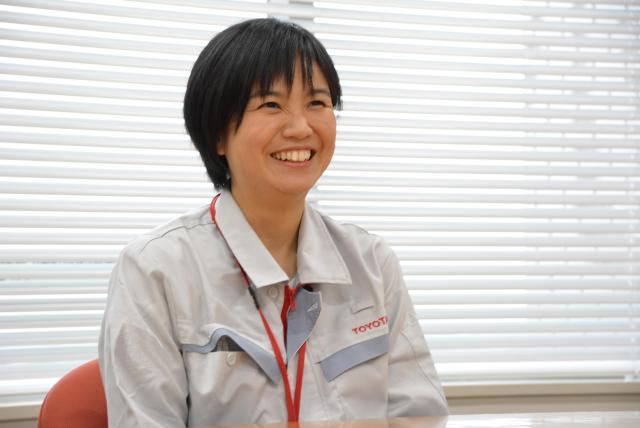
As a mother of a child with a disability, Sugihara is passionate about figuring out ways to keep a job and bring up her children.

Introduction
To Toyota Times readers,
Originally, this series of articles was scheduled to coincide with the start of the Tokyo 2020 Olympic Torch Relay, on March 26, 2020. The series was designed to introduce the Toyota employees selected to serve as torchbearers.
These torchbearers have expressed a desire to share that they are not running for themselves, but that they are running "for someone else."
Unfortunately, with the postponement of Tokyo 2020, the Tokyo 2020 Olympic Torch Relay has also been postponed.
For the Toyota torchbearers, however, while not able to run right now, there is no reason to delay highlighting their reasons for running. Therefore, this series will continue as scheduled, and it is hoped that readers will come to understand the desires and expectations the torchbearers have placed on their involvement in this once-in-a-lifetime opportunity to run.
Kahori Sugihara, External Logistics Reform Dept., Logistics Administration Division

Mother of two sons, Kahori Sugihara has worked continuously for the past 17 years, aside from taking leaves of absence twice for childcare purposes, in the field of logistics since joining Toyota in 2002.
Toyota is currently undergoing a major procurement and logistics reform project, resulting in a period of considerable and sudden change in the area of logistics, particularly from suppliers to Toyota plants. In addition to carrying out general administrative tasks, Sugihara, eyeing further advances to her career, has also started coordinating with external suppliers. One goal: she hopes to become a role model of “work style reform,” an initiative that aims to improve efficiency while utilizing remote work.
“I value communication with supervisors and colleagues in the workplace; you won’t last long [in remote work] if you can’t get help from others.”
Smiling affably, Sugihara successfully returned to work after her second childcare leave in May 2018. Then, around a year later, as she was getting used to the new work style, the call for torchbearers for the Tokyo 2020 Olympic Torch Relay came.
“At first, I thought, ‘Oh, torchbearer recruitment, that really has nothing to do with me.’ However, I told my sons about it when I returned home, and they said, ‘Mom, it would be so cool if you ran’ (laughs). Gradually, I thought it might be something I would like try for, thinking ‘If I run as a torchbearer, I will probably be a hero to my boys.’
I sent the application with my response to, 'Why I would like to take the position' of being a torchbearer, and it was selected from among other candidates. I was very surprised because I didn’t expect to be chosen – it was exciting news for me and my sons.”
Never giving up on the idea of working again
Sugihara was indeed selected as one of the Tokyo 2020 Olympic torchbearers, thanks to the encouragement she received from her children. Now, she wants to say to others:
This message was important, because the path to this realization and feeling was long, even for Sugihara.

“Originally, I had planned to return to work when my second son turned two years old. However, his cerebral palsy became a stumbling block to do so, as nurseries and daycare centers refused to take care of my son, citing the safety of other children as their reason.
Despite the situation, I really wanted to return to the workplace, so I consulted with a social worker who introduced me to facilities that specialized in providing support for people with developmental disabilities. I searched for a nursery school-like facility from among the list they provided, trying to find one where parents could leave their children for the day. After broadening my search to a neighboring city, I finally found what I was looking for. So, I arranged to take my son there, using the first year as a trial.
However, I thought it would be nice for my son to be able to spend time in a nursery school with able-bodied children, so I never gave up looking for that kind of setting. I had numerous interviews with city officials, bringing my son along so they could see the state of his development. Finally, we were granted access to a city-designated facility and now he attends a nursery school nearby my neighborhood.”Despite the amount of time it took one year, Sugihara’s diligence paid off as the devoted mother concluded her steady negotiations with city officials and enrolled her son in a nursery school in April 2019.
“My son’s growth over the past year has been amazing. There were many children in similar situations at the facility who provided support for those with developmental disabilities. I had the feeling that my son did not expect much more for himself than those around him at that time. However, at his current nursery school, he is surrounded by kids who can do various things, and I think it has stimulated him.
Originally, he could only walk about five or six steps with assistance. Now, while other children lead him around by the hand, he is sometimes able to walk alone. He watches them practice for sports day and is now also trying to run a bit himself. He still falls a lot; however, I am really amazed that he has now progressed to the point that he is trying to run.”
I would like to see such thinking disappear from this world
Sugihara was able to successfully find a desirable environment for her son and return to work herself. However, she says parents of children with disabilities or impairments still face difficulties in trying to work.
“I believe that developmental support facilities are the first step for children with disabilities. However, rules stipulating that a parent must be present with the child at such facilities is a hindrance. At a company like Toyota that has support systems and understanding colleagues, it is fine; if you don’t have that kind of environment, you have to quit your job. These situations can be utterly heart-breaking.”
As she continued to talk, Sugihara was suddenly overcome with emotion and had to pause. Continuing, she said:
“Sorry…. even now, I can easily recall a shocking phrase that was said to me. When I was trying to find a place that would accept my son, a staff member at one city office asked me disapprovingly, ‘Should a mother who has a child with a disability or an impairment really be working?’ Being asked that was very difficult emotionally.
Of course, I understand that reaction. Even I feel that it is probably better to always be beside my child. Still, it can also be trying to not be actively engaged with society through work, don’t you think? How else can I put it? Without work, I came to question my relationship with society and wondered if I was really needed. That was very painful.
Perhaps the staff member really did not say it with mal intent. But from my perspective, it was very challenging because it made me feel that I am not supposed to work because I have a child with a disability. I would like to see such thinking disappear from the world.”
Connecting the feeling of gratitude with a spirit of challenge
Fortunately, Sugihara is surrounded by a supervisor and colleagues who strongly back her up. To them and their constant support, she expressed thanks:
“Everyone is very warm and friendly. They always welcome me back after my childcare leaves, and sometimes even give me encouragement. Also, colleagues would visit me at my home on weekends; they are like family to me. I am delighted to have such great colleagues who make work a fun place to go to every day.”
Now that she has been selected as a torchbearer, the atmosphere of encouragement from all the other members in the department is noticeably increasing day by day. Her manager told her laughingly that everyone in the group were planning to leave work early to cheer for her.
“I express my sincere gratitude for all the support I have been given. Many have said that they are going to go see me run. I can’t say how much I appreciate it.
From my experience I want to teach my sons, who motivated me to run, the importance of taking on a challenge. I want them to know that challenges can be accomplished with the support of the people around us. As I carry the torch, I will be certain to remember to be grateful for all those who support me. My sons may be too young to fully understand, but the importance of taking on challenges and being grateful for those around you who provide support are the messages I hope to convey when I take my turn to run as a torchbearer.”
Kahori Sugihara was originally scheduled to run her portion as torchbearer in Obu City, Aichi Prefecture. Despite the postponement, she is becoming a role model, one who continues take on challenges after overcoming many difficulties to return to work, where she is blessed with both a very supportive supervisor and colleagues. Her two sons, together with all of her other supporters during the time she will be running in the future, will watch attentively, and will be proud of their mother as a ‘one-of-a-kind-hero.’

